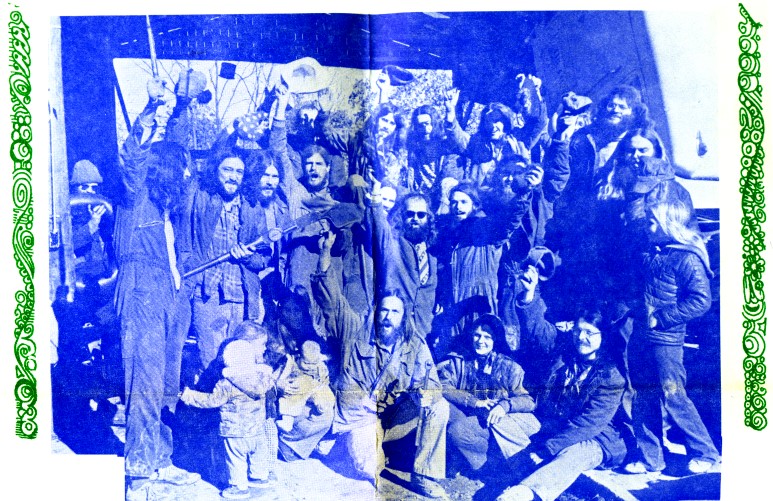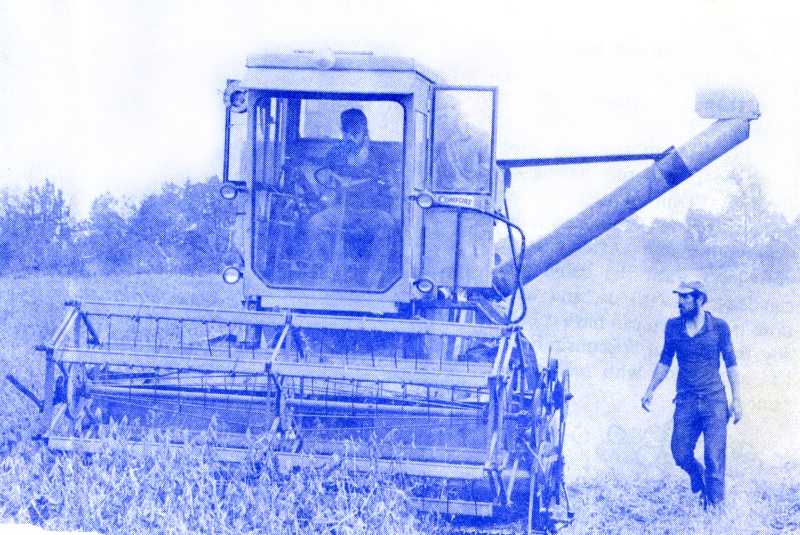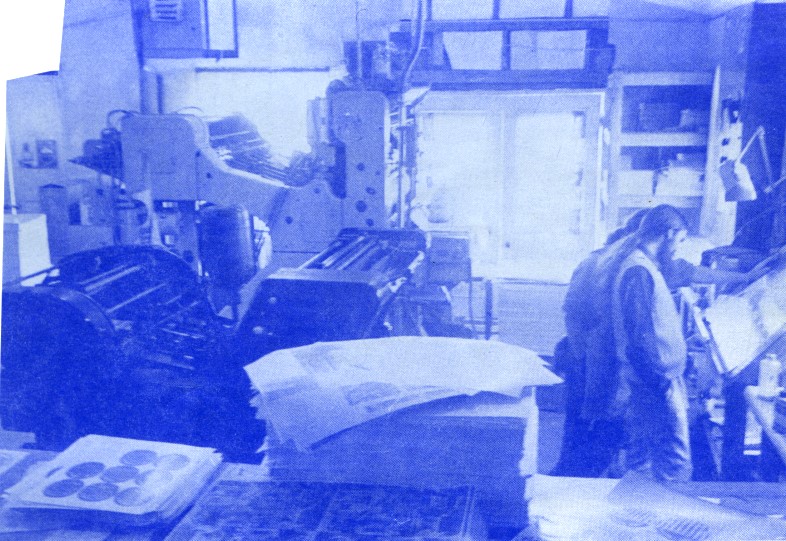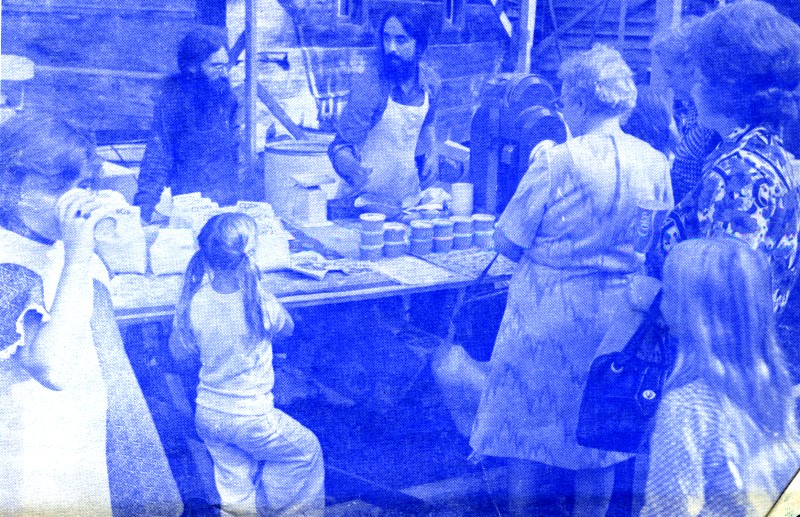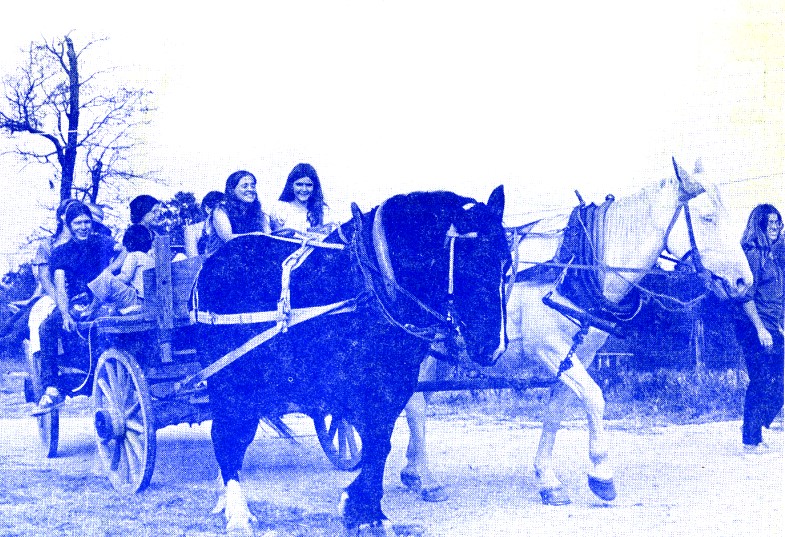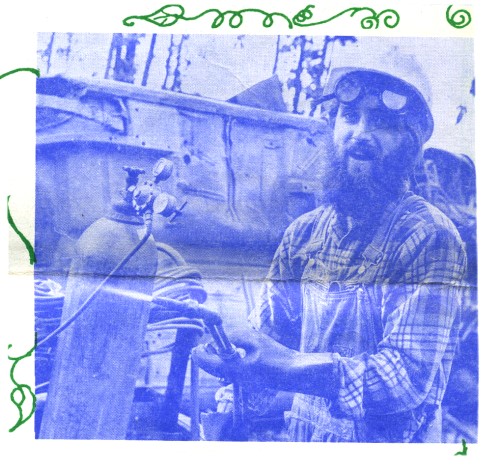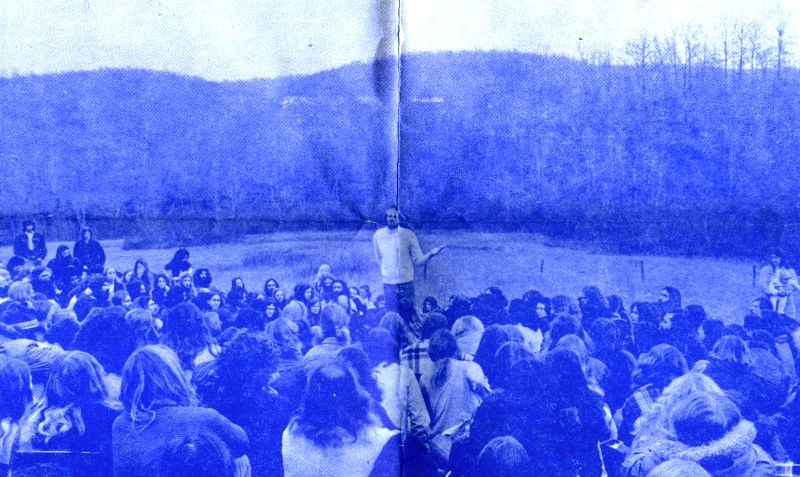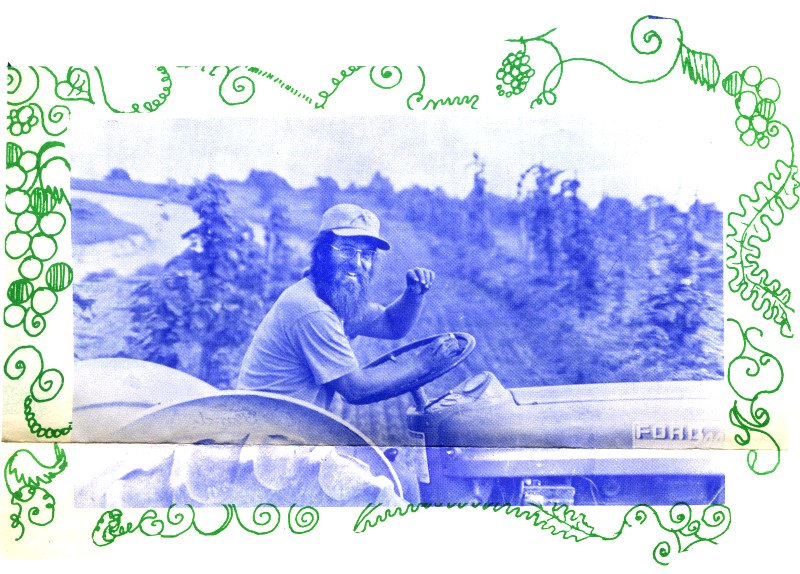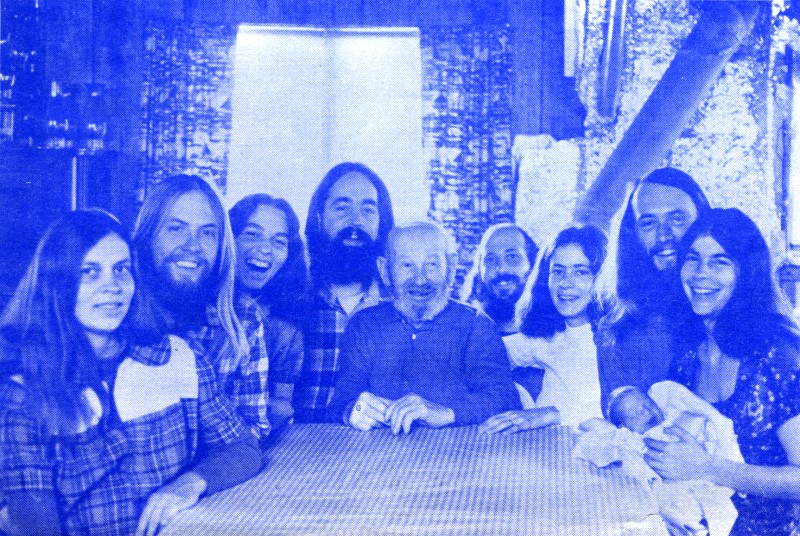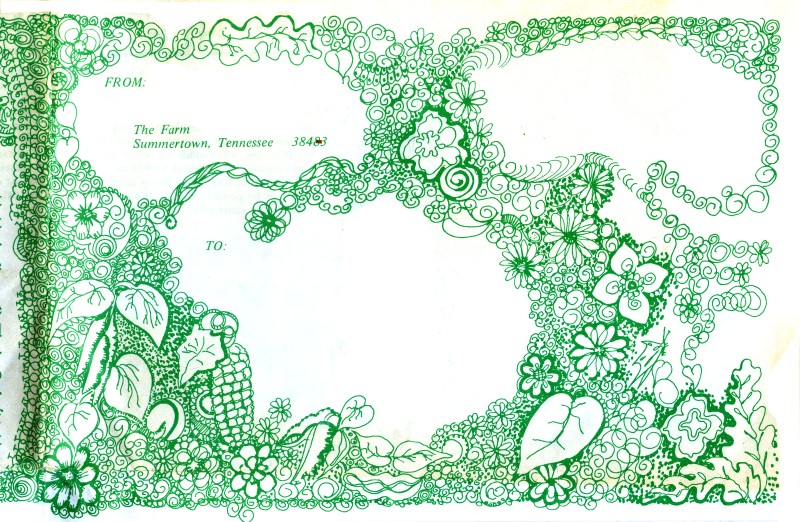January, 1975

 We’re trying to find God. Not in the sense that we’re lost from him, because you can’t be lost from Him – He’s everywhere and He knows where you are even if you don’t know where He is.
We’re trying to find God. Not in the sense that we’re lost from him, because you can’t be lost from Him – He’s everywhere and He knows where you are even if you don’t know where He is.
But that we’re banded together like this, and living the simple sort of peasant life in an effort to clean up our minds and clean up our way of life, to make it a simple way of life so we can have a lot left over to look for God.
We’re in the midst of our fourth winter on The Farm and we’re more thankful everyday to be living together out here on a patch of farmland in the Tennessee woods. The Farm is a householder monastery. We live in families and hold our material possessions in common. Of 750 people, 320 are married and 251 are children. Stephen is our spiritual teacher, Minister, and the abbot of the monastery. He began teaching 8 years ago in San Francisco, leading Monday Night Class, an open, weekly meeting, for four years. In October of 1970 he embarked on a Caravan speaking tour around the United States accompanied by hundreds of his students, traveling in converted school buses and trucks. After seven months on the road, the Caravan settled in Lewis County to found a new spiritual community. Since that time, we have come to feel very much at home and part of the life in Middle Tennessee. This past summer, The Farm Band appeared in four county fairs in the Mid-State area, and is currently working on a third album. Stephen has made four American tours with the band in the last three years and plans to go circuit riding again this spring.
For years, Stephen has been saying that if people don’t be greedy with the goods, there’s plenty to go around. We’ve chartered another nonprofit corporation, independent of The Foundation. Its called “PLENTY.” The purposes of the corporation are charitable, as stated in the charter, to act as a channel “to help share out the world’s food, resources, materials and knowledge equitably for the benefit of us all,” to be a reservoir of volunteers, “to help and aid any people anywhere in the world who, due to any natural or man-caused disaster, are in need… “ Also, “to establish and operate orphanages and foster homes to care for and provide homes for orphans from all countries…”
The world is becoming so small and communications are becoming so fast that what you do here affects somebody somewhere else. And it’s really important that we get along well together. It’s so ecological – you know, instead of everybody having to have their own separate fancy piece of equipment, a bunch of people can share it and have access to use of it. And because they can get along together and love one another, they can share that and stretch it out and make it go farther. What we can really do, basically, first, is love one another. That makes it easy for us to get along good. That’s really one of the best things we can do.
Stephen
The Gate is a combination of communication center, rap house, welcome wagon, and roadside Inn. A rotating crew receive visitors, provides tours, records the traffic, rounds up stray critters, and dispatches the ambulance, which is available to the neighbors as well as The Farm community. A trained Emergency Medical Technician is on duty 24 hours a day. Over the last 12 months, 13,000 visitors passed through our gates – traveling beatniks, neighbors, parents and relatives, student classes, community organizations, church groups, news men and tourists.
Motorpool
Greetings and salutations from all our boys at Mr Kaputi’s celebrated shop. Mr. Kaputi himself, the gentle wizard el maestro, Amy the Fair, the Tall Texan, Siphoning John and a veritable host of cracker-jack grease monkeys, welders, and heavy equipment operators. Keeping a family of 750 rolling, & a yard of vintage vehicles on the road requires at least as much good humor and chutzpah has it does gasoline and parts.
Our construction crew is a product of the apprentice system. The Carpenters have been learning their trade over years of working for professional contractors and builders in Nashville and Columbia. The crew has developed into our biggest breadwinner, doing most of their building off The Farm. Fielding as many as 6 sub -crews, they’ve been kept busy locally framing houses, building barns, and doing masonry and finish carpentry. The Wrecking Crew demolished a two-and-a-half story brick factory in Pulaski, and tore down a large meeting hall in Columbia – a good means of acquiring building materials these days. On The Farm they built the schoolhouse, a concrete block potato barn, and the phone building to house the relays for The Farm dial phone system (a gift from a neighboring phone company). They also framed up a bunch of tent-houses (foundation, floor and wall framing, with tent roof and canvas exterior walls) which can easily be converted to regulation houses later. Large, sturdy used surplus tents can be bought cheaply at army auctions.
Farming
Farming is our primary occupation. So far, the Farming Crew has managed to double the cultivated acreage each year. The Farm is 1750 acres. This past year the crew planted 500 acres, 200 of which was on our own land and the remaining 300 acres we rented from or share cropped with neighbors. Next year we plan to plant 1000. Despite an early killing frost and tomato blight, we had a good harvest this year: 85 tons of white potatoes, 40 tons of sweet potatoes, 65 tons of soybeans, 25 tons of tomatoes, 1374 bushels of corn, 1661 bushels of cabbage, 800 bushels of spinach, and lots of other grains and vegetables. We’d like to be able to grow enough food to support The Farm, feed ourselves, and feed some other folks who might not have enough.
The Print Shop is one of our cottage industries. We’re equipped with two Harris offset presses, a folder, paper cutter, stitcher, plate burner, composer, & a graphics department with light tables, copy camera and a dark room. We print our posters, album jackets, books, flyers, stationary, or anything else we might need, short of currency. We got the new Harris to keep up with the demand for Hey Beatnik! This is The Farm Book – the first book we’ve done completely on our own.45.000 copies have been printed.
The Mill goes to the Fair
Working in shifts covering 12 to 16 hours a day, our Millers grind wheat into unbleached white flour, whole wheat flour and cereal, soybeans into soy flour and soy grits, and buckwheat into buckwheat flour and kasha, all of which is distributed to Farm members through The Store. The Mill also roasts peanuts and soy nuts and grinds them into soy / peanut butter, and grinds 600 pounds of soybeans into soy grits every week, from which our soy dairy makes milk for The Farm. For the past two years we’ve taken several booths at the Middle Tennessee Arts and Crafts Fair, where we handed out soybean recipe books and sold our flours, cereals, and peanut butter, as well as soy bean ice cream, Farm style baked goods, fresh vegetables, needlework and woodwork items.
Sometimes we talk about what being a spiritual community is in terms of feeding us and clothing us and taking care of us and being good to all of us. But that isn’t all of what we are. In a sense we are a symbol that stands for God’s great full community. And we try to be all one as much as we can in any reasonable fashion the way this world that we live in has to be. That doesn’t mean that we just be homogeneous – the same stuff all the way through like a potato. We’re made up out of individuals, and were made up out of married couples, and were made up out of mothers and daughters and fathers and sons and brothers and cousins. We contain within us all the human relationships. But as a greater container, we’re all one, also. And being good to all of us is not saying, “Here’s this other person; be good to him.” It’s saying, “Here’s this other person who is myself, who is the same as me, same stuff.” Love thy neighbor as thyself.
 Using the natural techniques of spiritual midwifery, we’ve had more than 250 babies born on The Farm. Our midwives have a standing offer to any lady who might be considering having an abortion. “Don’t do it. You can come to The Farm, and we’ll deliver your baby. After that if you don’t want the baby, you can leave it with us, and we’ll raise it, and you can have it back anytime.” Our Wisconsin Farm has a midwife who makes the same offer.
Using the natural techniques of spiritual midwifery, we’ve had more than 250 babies born on The Farm. Our midwives have a standing offer to any lady who might be considering having an abortion. “Don’t do it. You can come to The Farm, and we’ll deliver your baby. After that if you don’t want the baby, you can leave it with us, and we’ll raise it, and you can have it back anytime.” Our Wisconsin Farm has a midwife who makes the same offer.
The Farm School
We built a new L-shaped school house this past summer. There are 65 kids in the school, from first grade through high school, with four full time and eight part time teachers. The kind of school were trying to develop is a balance somewhere between the too loose and the too rigid to provide the maximum education with the minimum conditioning. We teach reading, writing and arithmetic, history, Sciences, and languages, art, music and physical education.

In conjunction with the school, the older kids apprentice on The Farm. This year the high school will work with the Farming Crew and setting up our new beekeeping and honey operation.
Scrapping and Metal Salvage
Centuries after the advent of the Bronze Age and the Copper Age and the Iron Age, it looks like we have entered the Recycling Age. Our metal salvage operation, working with the motor pool, cashed in a thousand tons of scrap this year, pulling in a little income as well as cleaning up yards full of disintegrating old heaps and discarded gas hogs for miles around. The Farm junkyard is becoming one of our most treasured assets, providing an endless stockpile of parts and scrap for heavy equipment alterations, engine rebuilding, windmill manufacturing (out of transmission gears and rear ends) and all sorts of Mickey Mouse jobs.
Once a week we all come together and think the same thing and say the same thing for just a little while and be really one. And sometimes during the week some of us has to think about a tractor while somebody else thinks about a hammer and a 2×4. And we can’t all think the same thing all the time. We’ve got too much to do. But once a week we just come together for a while and picking not the lowest common denominator, but the in that place, to remind us of our essential oneness for all the rest of time we’re not being so formal about it. And all the time, even when some of us is thinking about getting some fruit, and some of us just thinking about digging an outhouse during the rest of the week, on the real higher level, above desires, we’re all one, and there’s an energy place where were all one, and it’s undifferentiated, and the energy that’s in one of us is just the same as the energy that’s in another one of us. And being all together makes there be a tremendous, powerful, strong pool of energy that we all partake in and share in, and we can reach for some of any time that we need some.
Stephen
Our religion isn’t supposed to be something different and separate, but it’s supposed to be like a solvent that melts away the differences between us and anybody else until the essential thing is left. If we really understand what we’re doing, we ought to be able to get it on and find essential agreement with anybody. We’re trying to be a universal key that’ll fit any lock. We want to make peace with our parents and let our kids grow up and be at peace with us.
Stephen
We share, not on the basis of being equal as in a political system, but on the basis that we’re all one, and it’s only right and only just as a minimum – not as some great effort of sharing that we accomplish, it has a minimum, that we all get the same thing: that we get to eat, that we all get shelter, that we all get clothes. That’s a minimum. And that, too, is symbolic of our greater spiritual sharing. And the less we be materialists, the more sharing we can do.
Stephen
Part of living on the land seems to be learning how to ride the surf of the seasons. The Firewood Squad and the Canning and Freezing Ladies have to hustle all through the summer months in order to carry us over the long winter. This year the ladies put up over 25,000 quarts of assorted fruits and vegetables, some by canning and jars and the rest stored and walk-in freezers. An added attraction at the Canning Center was the peak of the season parties of 40 or 50 people would can and boogie all night, encouraged by a generous supply of live rock and roll, tea and fudge.

Eating a totally vegetarian diet has lots of benefits – healthwise, landwise and Pennywise. Our kids are nice and fat; we can feed 10 times more folks by what we grow and it only cost $0.40 a day per person to feed us – including farming expenses and purchases of sugar, margarine, and other commodities.
We do a lot with soy beans, eating them cooked as beans and grits, baking with soy flour, as well as making such dairy products as milk, ice cream and cheese. We made a booklet of favorite recipes and nutritional information called “Yay Soybeans!” It can be ordered free from The Farm.







